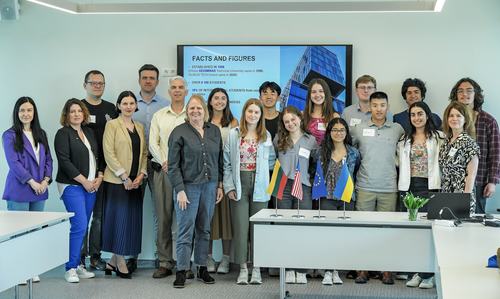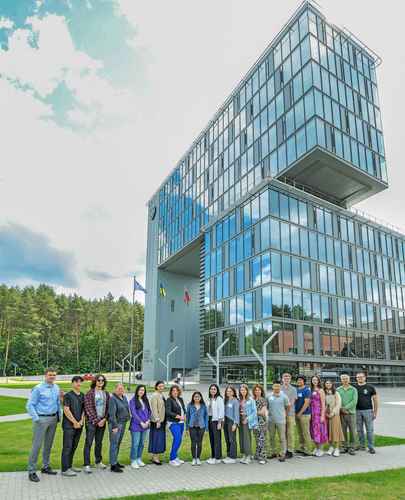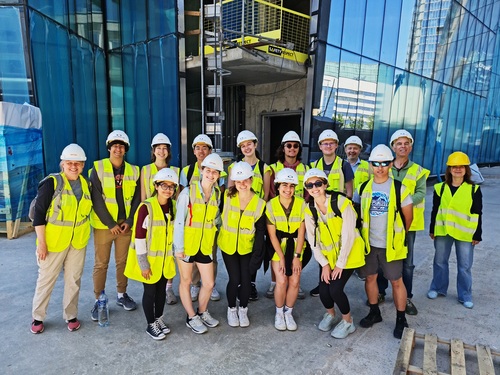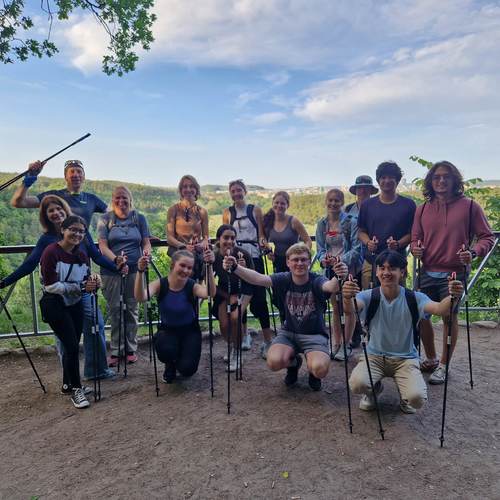Home
For international students
Sustainable Discoveries: American Students' Reflections on the Sustainability Summer School in Vilnius
- Programmes in English 2025/2026
- Admission 2025/2026 Scholarships
- For exchange students
- Free Movers
- Transfer studies
- Erasmus+ studies and traineeships
- Mentor programme
- Student testimonials
- Accommodation
- Career Services
- Medical Care
- Immigration Regulations
- Leisure and Student Activities
- Useful information
- VILNIUS TECH for Creators of Tomorrow
- Mental and spiritual support
- Representatives Abroad
- Contacts
- Computer Engineering
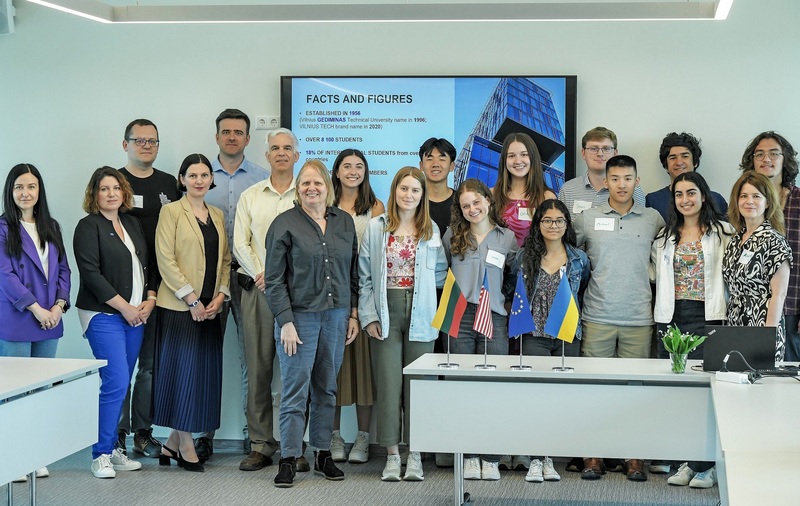
2023-06-06
Sustainable Discoveries: American Students' Reflections on the Sustainability Summer School in Vilnius
Over the past couple of weeks students from the University of Virginia (USA) attended the Sustainable Urban Design Challenges Summer School at VILNIUS TECH. The summer school brought together students from different disciplines to study and discuss interdisciplinary solutions for building sustainable cities. These students found common ground in their passion for sustainable urban design and formed a cohesive group during their time in Vilnius. From workshops to cycling tours – students had a chance to explore VILNIUS TECH and Vilnius, and learned about sustainability practices in a different cultural context. We had a quick chat with students about their experiences in Vilnius, and we would like to share a few of their thoughts (which showcases the importance of cultural exchange and interdisciplinary collaboration in addressing global sustainability challenges):
Language and people
“It has been wonderful. Everyone here speaks very good English, which is so impressive. You can communicate very easily. Also, people here are so welcoming and super-friendly”
“Lithuania is unique. It has a unique language, which is a significant part of Lithuanian culture. The Lithuanian language is believed to be the closest sounding thing of how our ancestors spoke thousands of years ago”
Interdisciplinarity and group dynamics
“A lot of topics we are studying and the solutions are interdisciplinary. It's not as simple as one major providing a fix. You need everybody to come together in order to fix it”
“You could look at it from so many different lenses in terms of building more sustainable neighborhoods and cities. For instance, you could apply principles from computer science, such as data optimization, or look at it from an architectural point of view and – we recently had a lecture about it – build green buildings. I think that our group's diverse majors will contribute to a more comprehensive report in the end”
“Since we all came for the same reason to learn about sustainable design and we all as a group experiencing new things, I think that made us become a real group”
Green city
“All the green spaces make the city feel less suffocating. I mean it's definitely walkable, but it is also nicely spread out. We've been walking a lot, and we are planning to go on a few bike tours. In the evening, we are free to explore and do whatever we want. We've done a lot”
“I would like to mention the walkability, bikeability, and public green spaces of the city. We have been discussing it, and I have noticed it everywhere we go. The sidewalks are wide, well laid out, and the separate bike lanes are so nice. Even though the city is entirely new to me, but I never felt lost. You can just really easily orient yourself in this city, there are big landmarks like, oh there's the Bell Tower, there's the Cathedral. I know where I am, which just makes it really helpful to be in a new place. I think it's a very good city for beginner travelers”
Difference from the US
“Vilnius doesn’t feel like a city in the US. The feelings are very different when you just walk around. We all have said that we feel much safer here. It has been quite easy to walk around even late at night”
“It doesn't feel as crowded here. In cities in the US, you always feel like you are kind of on top of each other. Also the city is very clean”
“The dining culture here is different. In the US, it often feels more hasty, whereas here it seems that dinners tend to take around three hours. Is it common in your households to spend that much time during dinner? It’s nice, because you spend more time to get to know each other. It's a form of a break”.
Sustainability practices
“It has been really refreshing to see how many people at different levels of the university, as well as in the government, are aware of various sustainability practices. We would also like to spend time with young people and hear their opinions and perspectives. I have also been learning a lot from the questions posed by my peers from different fields, and it has been truly eye-opening”
“Another difference between the US and here, in terms of sustainability, is that sustainability feels more like an afterthought in the US, added on to the design, whereas here it feels like sustainability is an integral part of the design thinking process from start to finish. This approach is refreshing to see, as it emphasizes the preventative nature of sustainability”
“We've been talking a lot since we've got here about the idea of a circular economy and trying to reduce waste in all aspects, you know, whether it's using an item, constructing a building, or any other activity. While this idea is mentioned in the United States, but it's definitely not a priority. Here in Lithuania, it really feels like priority to just think about what it is that we're using and could we be doing it better. I really do like that the focus is there in Lithuania”
“Last semester I took a virtual design course focused on programming plans prior to construction. It involved utilizing models, which incorporate cost estimations throughout the timeline. You can already integrate the sustainability aspects to the design before they're being built and to see how we can not only maintain these aspects but also keep comprehensive records to understand how much more sustainable buildings can be even before they are constructed”
Embracing technology in sustainability
“One thing that I think is like really cool that we have learned here is the application of computer science systems in building infrastructure. These systems increase efficiency by monitoring temperatures, collecting a lot of data, and implementing micro-level improvements. I think that's really cool thing that computer science could be used for. Also, we have seen a lot of open data movements. For instance, there is an open data portal dedicated to building information, providing accessibility and facilitating the collection of valuable information”
“Regarding renewable technology, I have seen things even in the energy museum. We went there yesterday. One idea that caught my attention was a wind turbine designed to be placed in the jet stream, allowing it to harness energy from that high-altitude location. I believe that these types of future projects, targeting higher altitudes, would greatly contribute to harnessing Earth's renewable resources”
“When you observe the Earth from space and utilize satellites to capture images, you gain a comprehensive view of the planet's surface that you can't see just standing on the ground. You could see air particles in the atmosphere, as well as measure average temperatures. You can see where we are as a planet going, basically. And what we can do to stop the climate change”
Studying at VILNIUS TECH
“Personally, I would definitely study at VILNIUS TECH. The professors we have been working with are incredibly knowledgeable and helpful. Especially when it comes to answering our questions. I mean their lectures are great, but then we pose all these different questions and they immediately have these, you know, super intellectual and really smart answers. That was just what I was looking for. It truly showcases their expertise. At the same time they are so nice and welcoming. Overall, I have really enjoyed interacting with the faculty here”
Recommendation to friends in the US
“The history here is incredibly profound, and everybody just seems deeply aware and appreciative of that fact and just trying to preserve it. And also, yeah, the natural beauty of the surroundings and the forward thinkingness of the people I think is really awesome”
“It's a place with a unique culture, that is not Americanized whatsoever. The city itself is beautiful, and it seems they are making efforts to promote tourism, but in way that preserves culture. So, without a doubt, I would recommend it to anyone. Moreover, what we are learning here appears to be highly applicable in the US. We can assess the pros and cons of the what’s being done here and determine what we can learn from and improve upon in the US”
“I also think people from the US would greatly benefit from visiting here because I think there's a mindset in the US that sustainability conflicts heavily with economics or quality of life. But when coming here it becomes evident that this notion is not true. I think sustainability here has increased the quality of life and economic well-being, and reduced inequality, and all these aspects, so, yeah, I would recommend visiting”
Language and people
“It has been wonderful. Everyone here speaks very good English, which is so impressive. You can communicate very easily. Also, people here are so welcoming and super-friendly”
“Lithuania is unique. It has a unique language, which is a significant part of Lithuanian culture. The Lithuanian language is believed to be the closest sounding thing of how our ancestors spoke thousands of years ago”
Interdisciplinarity and group dynamics
“A lot of topics we are studying and the solutions are interdisciplinary. It's not as simple as one major providing a fix. You need everybody to come together in order to fix it”
“You could look at it from so many different lenses in terms of building more sustainable neighborhoods and cities. For instance, you could apply principles from computer science, such as data optimization, or look at it from an architectural point of view and – we recently had a lecture about it – build green buildings. I think that our group's diverse majors will contribute to a more comprehensive report in the end”
“Since we all came for the same reason to learn about sustainable design and we all as a group experiencing new things, I think that made us become a real group”
Green city
“All the green spaces make the city feel less suffocating. I mean it's definitely walkable, but it is also nicely spread out. We've been walking a lot, and we are planning to go on a few bike tours. In the evening, we are free to explore and do whatever we want. We've done a lot”
“I would like to mention the walkability, bikeability, and public green spaces of the city. We have been discussing it, and I have noticed it everywhere we go. The sidewalks are wide, well laid out, and the separate bike lanes are so nice. Even though the city is entirely new to me, but I never felt lost. You can just really easily orient yourself in this city, there are big landmarks like, oh there's the Bell Tower, there's the Cathedral. I know where I am, which just makes it really helpful to be in a new place. I think it's a very good city for beginner travelers”
Difference from the US
“Vilnius doesn’t feel like a city in the US. The feelings are very different when you just walk around. We all have said that we feel much safer here. It has been quite easy to walk around even late at night”
“It doesn't feel as crowded here. In cities in the US, you always feel like you are kind of on top of each other. Also the city is very clean”
“The dining culture here is different. In the US, it often feels more hasty, whereas here it seems that dinners tend to take around three hours. Is it common in your households to spend that much time during dinner? It’s nice, because you spend more time to get to know each other. It's a form of a break”.
Sustainability practices
“It has been really refreshing to see how many people at different levels of the university, as well as in the government, are aware of various sustainability practices. We would also like to spend time with young people and hear their opinions and perspectives. I have also been learning a lot from the questions posed by my peers from different fields, and it has been truly eye-opening”
“Another difference between the US and here, in terms of sustainability, is that sustainability feels more like an afterthought in the US, added on to the design, whereas here it feels like sustainability is an integral part of the design thinking process from start to finish. This approach is refreshing to see, as it emphasizes the preventative nature of sustainability”
“We've been talking a lot since we've got here about the idea of a circular economy and trying to reduce waste in all aspects, you know, whether it's using an item, constructing a building, or any other activity. While this idea is mentioned in the United States, but it's definitely not a priority. Here in Lithuania, it really feels like priority to just think about what it is that we're using and could we be doing it better. I really do like that the focus is there in Lithuania”
“Last semester I took a virtual design course focused on programming plans prior to construction. It involved utilizing models, which incorporate cost estimations throughout the timeline. You can already integrate the sustainability aspects to the design before they're being built and to see how we can not only maintain these aspects but also keep comprehensive records to understand how much more sustainable buildings can be even before they are constructed”
Embracing technology in sustainability
“One thing that I think is like really cool that we have learned here is the application of computer science systems in building infrastructure. These systems increase efficiency by monitoring temperatures, collecting a lot of data, and implementing micro-level improvements. I think that's really cool thing that computer science could be used for. Also, we have seen a lot of open data movements. For instance, there is an open data portal dedicated to building information, providing accessibility and facilitating the collection of valuable information”
“Regarding renewable technology, I have seen things even in the energy museum. We went there yesterday. One idea that caught my attention was a wind turbine designed to be placed in the jet stream, allowing it to harness energy from that high-altitude location. I believe that these types of future projects, targeting higher altitudes, would greatly contribute to harnessing Earth's renewable resources”
“When you observe the Earth from space and utilize satellites to capture images, you gain a comprehensive view of the planet's surface that you can't see just standing on the ground. You could see air particles in the atmosphere, as well as measure average temperatures. You can see where we are as a planet going, basically. And what we can do to stop the climate change”
Studying at VILNIUS TECH
“Personally, I would definitely study at VILNIUS TECH. The professors we have been working with are incredibly knowledgeable and helpful. Especially when it comes to answering our questions. I mean their lectures are great, but then we pose all these different questions and they immediately have these, you know, super intellectual and really smart answers. That was just what I was looking for. It truly showcases their expertise. At the same time they are so nice and welcoming. Overall, I have really enjoyed interacting with the faculty here”
Recommendation to friends in the US
“The history here is incredibly profound, and everybody just seems deeply aware and appreciative of that fact and just trying to preserve it. And also, yeah, the natural beauty of the surroundings and the forward thinkingness of the people I think is really awesome”
“It's a place with a unique culture, that is not Americanized whatsoever. The city itself is beautiful, and it seems they are making efforts to promote tourism, but in way that preserves culture. So, without a doubt, I would recommend it to anyone. Moreover, what we are learning here appears to be highly applicable in the US. We can assess the pros and cons of the what’s being done here and determine what we can learn from and improve upon in the US”
“I also think people from the US would greatly benefit from visiting here because I think there's a mindset in the US that sustainability conflicts heavily with economics or quality of life. But when coming here it becomes evident that this notion is not true. I think sustainability here has increased the quality of life and economic well-being, and reduced inequality, and all these aspects, so, yeah, I would recommend visiting”












